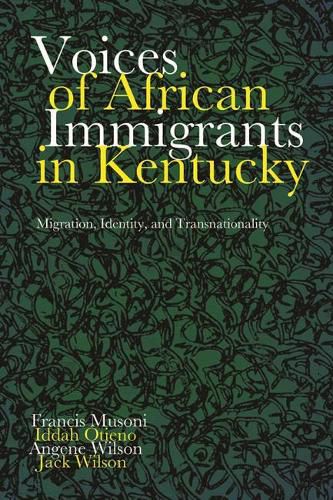Readings Newsletter
Become a Readings Member to make your shopping experience even easier.
Sign in or sign up for free!
You’re not far away from qualifying for FREE standard shipping within Australia
You’ve qualified for FREE standard shipping within Australia
The cart is loading…






Following historical and theoretical overview of African immigration, the heart of this book is based on oral history interviews with forty-seven of the more than twenty-two thousand Africa-born immigrants in Kentucky. From a former ambassador from Gambia, a pharmacist from South Africa, a restaurant owner from Guinea, to a certified nursing assistant from the Democratic Republic of Congo – every immigrant has a unique and complex story of their life experiences and the decisions that led them to emigrate to the United States. The compelling narratives reveal why and how the immigrants came to the Bluegrass state – whether it was coming voluntarily as a student or forced because of war – and how they connect with and contribute to their home countries as well as to the US. The immigrants describe their challenges – language, loneliness, cultural differences, credentials for employment, ignorance towards Africa, and racism – and positive experiences such as education, job opportunities, and helpful people. One chapter focuses on family – including interviews with the second generations – and how the immigrants identify themselves.
$9.00 standard shipping within Australia
FREE standard shipping within Australia for orders over $100.00
Express & International shipping calculated at checkout
Following historical and theoretical overview of African immigration, the heart of this book is based on oral history interviews with forty-seven of the more than twenty-two thousand Africa-born immigrants in Kentucky. From a former ambassador from Gambia, a pharmacist from South Africa, a restaurant owner from Guinea, to a certified nursing assistant from the Democratic Republic of Congo – every immigrant has a unique and complex story of their life experiences and the decisions that led them to emigrate to the United States. The compelling narratives reveal why and how the immigrants came to the Bluegrass state – whether it was coming voluntarily as a student or forced because of war – and how they connect with and contribute to their home countries as well as to the US. The immigrants describe their challenges – language, loneliness, cultural differences, credentials for employment, ignorance towards Africa, and racism – and positive experiences such as education, job opportunities, and helpful people. One chapter focuses on family – including interviews with the second generations – and how the immigrants identify themselves.